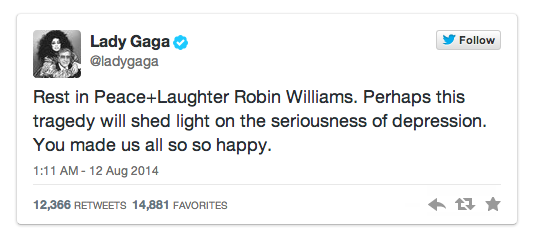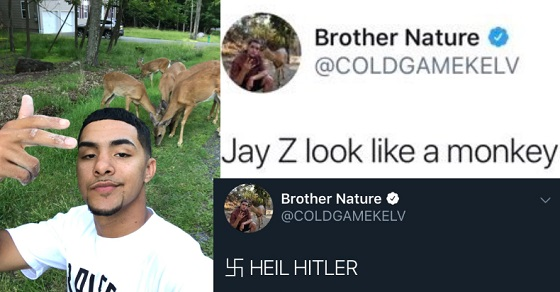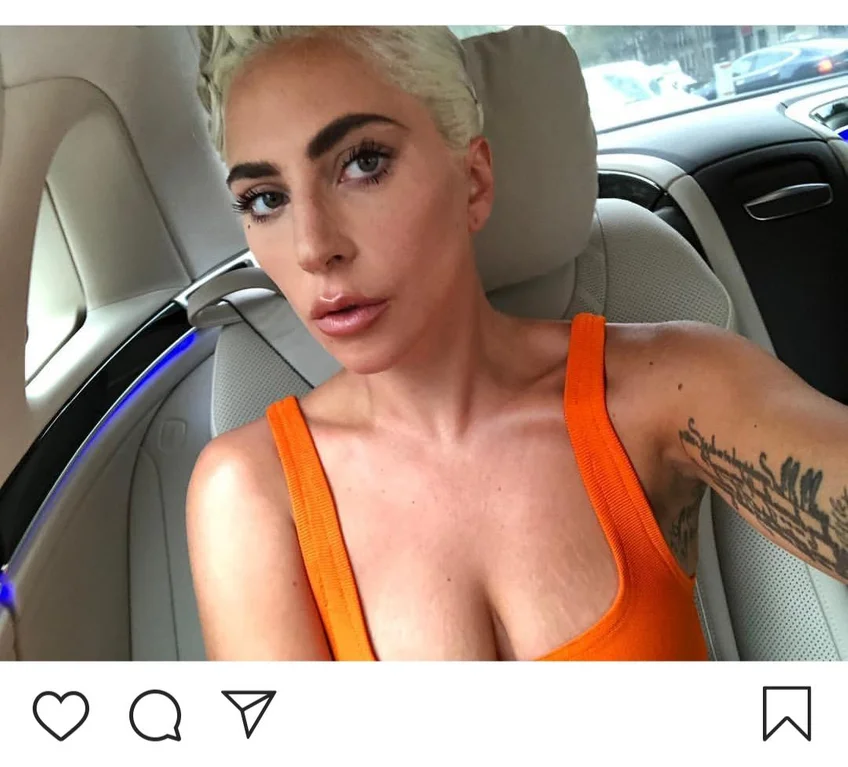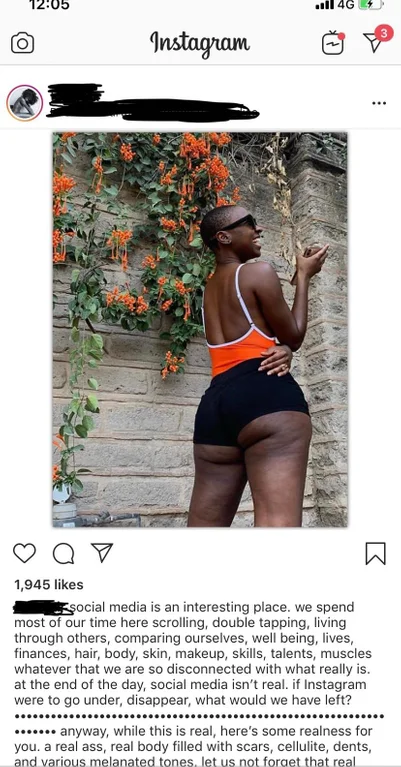2014:
With Robin Williams, passing in 2014 came splurge of social media attention. It was perceived as tragic that someone who had made others laugh, was in fact, depressed himself. I believe that 2014 was the year that social media began to positively transition from keyboard warriors and trolls, to a place that allowed more room for discussion.
Following his death, a lot of people took the opportunity to open the conversation about mental health. Celebrities themselves even used their status and platform to do this, normalizing mental health concern as well as reducing the stigma by talking about it.
This was a great time for social media, as it was a time where people began to be able to talk openly about their mental illnesses.
Personally, I felt that it was sad that he killed himself, but comforting in that it could be any one of us. Around this time, I was 14 and began to feel a bit off, and tried to open up with my parents and friends about my potential illnesses and struggles.

In 2014, #BlackLivesMatter began to grow as a movement. Two years prior, Trayvon Martin was unjustly murdered, then in 2014, Michael Brown was shot dead by those who are supposed to protect us. Again, discussion was opened up. Was racism in America really this bad? How do we stop it? And how many black and brown bodies have to pile up to get it to stop?

The spread of news and distraught began a movement that brought attention and awareness to racism that was previously (and currently, unfortunately) thought to “not exist”.
These conversations, about mental health and institutional/systematic racism, though uncomfortable, are important and are things that we can no longer ignore. With social media, it was made easier to bring attention to these issues faster, as well as a broader amount of people.
With these positive advancements, comes negative ones as well. Because news is spread faster and to a broader amount of people, counter cultures will always have a platform to be openly hateful and get attention.
In response to #BLM was #BlueLivesMatter (which in itself is ignorant because you choose to be a cop, you don’t choose to be black), essentially telling black people to shut up and quite there voices. The effects of counter culture caused some [more, perceived] racial tension in the US.
Siva Vaidhyanathan believes Trump won the election because of something similar to counter culture. Essentially, Facebook and other social media sites allow us to filter what we do and don’t want to see-- so we’re constantly surrounded by “yes men”.
You can see this idea within the #BLM vs #BlueLivesMatter discourse in 2014. Many people on both sides gained popularity, so it’s hard to get through to people and have their minds change if everyone else is telling them that their opinion is the right one.
Even amongst my friends, politics and mental health are uncomfortable topics to talk about because there is no room for neutrality or open mindedness.
While it was good in 2014 that serious topics began being discussed, the way that they’re discussed is not always civil, and takes away from that original good.
2019:
There is a lot of good, positive things that have happened on social media in 2019, but when trying to think of things to write about, I could only come up with the bad ones quickly.
To me, that means that not necessarily a lot of bad things are happening, but that they’re what gets pushed toward the forefront by popular culture.
This year had a lot of YouTuber drama, and was a “good” year for a whole lot of bad press. 2018 should have been a warning into what 2019 was going to become, considering Jake Paul’s suicide forest scandal, and Tana Mongeau's TanaCon scandal.
James Charles is a makeup YouTuber who just can’t catch a break. Admittedly, he is a jerk, but with the microscope social media users put him under, I imagine it’s hard not to be. One wrong move and everything goes to crap.
In 2019 alone, he’s publicly outed a straight man who rejected him, bullied two kids about not liking his (cheap) makeup palette, tried to charge 500$ for his “makeup tour” (wear really he just sang poorly and danced equally as poorly in front of an audience), and other things.
He is well known for tweeting and deleting, as well as sending his fans to hate on people. I believe having such a huge social media following in the first place is toxic within itself, as it promotes stan and cancel culture; really giving no one the opportunity to be able to redeem themselves, while at the same time creating a larger fanbase for those who don’t care and are now viewers themselves.
The promotion of cancel culture gives celebrities and personalities no room to grow.

Brother Nature wrote insensitive tweets years ago and was “exposed” for it. While we can all say that they were wrong, he was also around 13 years old when they were posted, and seems like a relatively nice guy now.
I myself was a rather awful teenager, and if someone pulled up my tweets from 5 years ago, they’d find ignorant things as well. Does this mean I should fear for my reputation and image- even though I was 15? Cancelling someone for things they said when they were young is toxic as they are no longer that person. Recent scandals, or even being racist 5 years ago and still being an adult, may be a reason to “cancel” someone; to cancel them in the now instead of for who they used to be, with no room for apologizing or change.
As for the good, I really like that social media comes with free education and awareness. As of late, #TrashTag has influenced people to go pick up trash/litter and prevent pollution, because we’re now aware far more about what we are doing to our planet.
https://twitter.com/decolonialatlas/status/1122495059394465792

Because of twitter, actually, I became far more aware of the state of our planet. I try to minimize my consumption of plastics and shop more ethically. It is hard to do, but it’s harder to imagine a future where we may not be able to safely walk outside.
Lee Humphrey’s “identity work” may apply in this case. While it may seem narcissistic to some to “pretend” to be an environmentalist and perform the act of picking up trash/spreading awareness, I actually think this is a positive thing.
Regardless of the intention of the person doing #TrashTag, they’re still picking up the trash, and therefore helping save the earth. So, even “pretending” to be a woke environmentalist for social media ends up being a really good thing. By spreading awareness with a large enough platform, surely there are some people (like me) who it would really resonate with.
2024:
In 2024, I think that people will become more aware and insecure in their self image and try to keep it as clean as possible. The Looking Glass Self is the concept that you behave how you imagine others view you; but with social media, people tell you how they view you. Whether it be behavioral (amount of likes, dislikes, etc) or in the comments.
With the popularity of FaceTune or Snapchat filters, it’s becoming normal to not look like yourself in photos. Being told that you look ugly without makeup on, or not complemented enough on your body when it isn’t photoshopped, will become increasingly harmful if we don’t do something about it.
But this could, in the future, easily be the good if we do take the right steps. Many people on social media are already refusing to edit their bodies, or show their “real” selves; exposing how lighting, angles, and poses can easily hide imperfections.

[ Ex 1: A woman who had children is still fit, but has loose skin and stretch marks. She shows herself flexing to hide that. ]

[Ex 2: Lady Gaga doesn’t have perfectly perky breasts, and she has stretch marks on them as well.]

[Ex 3: Explained in image].
By adding realism to social media, I think that in the future we can reduce dysmorphia and begin to accept our bodies as they are without plastic surgery or photoshopping. I myself try to take pictures without filters, so that when I look back at them I know what I "really" look like.
In the future, I think social media will be more good than bad, as more people begin to become aware and become a better version of themselves, or at least the “healthy” version of themselves that they think people want to perceive them as. We are already changing our environment for the better, I can see us as a society in the future changing our standards of beauty and our levels of toxicity.



